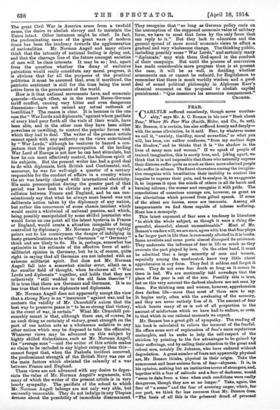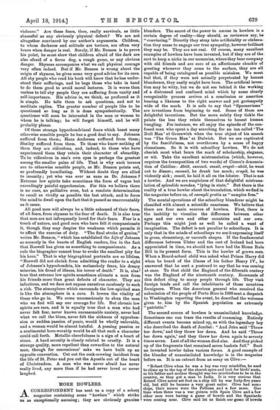FEAR.
" ARLYLE suffered ceaselessly, though never unutter- V1 ably," says Mr. A. C. Benson in his new " Book about Fear," Where No Fear Was (Smith, Elder, and Co., 6s. net). Mr. Benson, it is certain, has also suffered keenly and deeply—. with the same alleviation, be it said. Fear, by whatever name we call it, "anxiety, timidity, morel cowardice," or what you will, has been, our author confesses; "from my earliest days the Shadow," and he thinks that it is "the shadow in the lives of many men and women." If we speak of people of trained imagination, this is surely true, and, joking apart, we think that it is not impossible that those who naturally express their distress suffer quite as much as those more admired people who suffer in silence. The finest characters among the imagina- tive recognize with humiliation their inability to control the impulse to express their pain, and to analyse it, to exaggerate it, to impress it upon the minds of others in all its harsh and burning colours ; the worser sort recognize it with pride. The consolations of conscious courage are, however, as great as the alleviations which proceed from gifted speech. If some of the silent are heroes, some are insensate. Among all temperaments we fmd those capable of intense suffering. None has a monopoly.
This latest exponent of fear sees a tendency in literature "to shirk the whole subject, as though it were a thing dis- graceful, shameful, almost unmentionable." Most of Mr. Benson's readers will, we are sure, agree with him that fear plays a far larger part in life than is commonly allotted to it in books. Some novelists and some poets almost disregard its existence. They underrate the influence of fear in life as much as they overrate the part played by love. On the other hand, it must be admitted that a large minority of men and women, especially among the uneducated, know very little about apprehension in any form. They feel it seldom and forget it soon. They do not even fear death so long as it comes to them in bed. We are continually told nowadays that the place of the poor is out of the sun. Possibly this is true, but on this very account the darkest shadows are not seen by them. For thinking men and women, however, apprehension does darken life—more than most of them care to say. It begins early, often with the awakening of the memory, and they are never entirely free of it. The amount of fear which besets many of us is out of all proportion to the amount of misfortune which we have had to endure, or even to that which in our rational moments we expect.
Mr. Benson has a great gift of sympathy. The reading of his book is calculated to relieve the torment of the fearfuL He offers some sort of explanation of fear's more mysterious onslaughts, and he seeks to help the self-respect of the stricken by pointing to the few advantages to be gained by their sufferings, and by calling their attention to the great and robust men, notably Dr. Johnson, who have endured without degradation. A great number of fears not apparently physical are, Mr. Benson thinks, physical in their origin. Take the commonest and least serious form of fear—shyness. It is, in his opinion, nothing but an instinctiveterrorof strangers, and, together with a fear of solitude and a fear of darkness, would "seem to date from a time when such conditions were really dangerous, though they are so no longer." Take, again, the fear of " a scene" and the fear of arousing anger, which, for our part, we think far less common than Mr. Benson does. "The basis of all this is the primeval dread. of personal
violence." Are these fears, then, really survivals, as little shameful- as any obviously-physical defect ? We are not altogether convinced by our author's arguments. Children, to whom darkness and solitude are torture, are often very brave when danger is real. Surely, if Mr. Benson is to prove his point, he must show that children afraid of the dark are also afraid of a fierce dog, a rough game, or any obvious danger. Shyness accompanies what we call physical courage very often indeed. But if Mr. Benson is wrong about the origin of shyness, be gives some very good advice for its cure. All shy people who read his book will know that he has under- stood their sufferings, and he begs those who take in hand to do them good to avoid moral lectures. It is worse than useless to tell shy people they are suffering from vanity and self-importance. His advice is, we think, as profound as it is simple. He tells them to ask questions, and not to meditate replies. The greater number of people like to be questioned so long as it is dons sympathetically. The questioner will soon be interested in the man or woman to whom he is talking; he will forget himself, and he will probably please.
Of those strange hypochondriacal fears which beset many otherwise sensible people he has a good deal to say. Johnson suffered from them; Hans Andersen suffered from them; Shelley suffered from them. To those who know nothing of them they are ridiculous, and, indeed, to those who have experienced them they retain their character of absurdity. To be ridiculous in one's own eyes is perhaps the greatest among the smaller pains of life. That is why such terrors are to otherwise sensible people, as Mr. Benson points out, so profoundly humiliating. Without doubt they are allied to insanity ; yet who was ever as sane as Dr. Johnson P Extreme low spirits take sometimes the form of vague but exceedingly painful apprehension. For this we believe there is no care, no palliative even, but a resolute determination to recall as vividly as possible the last attack, and to force the mind to dwell upon the fact that it passed as unaccountably as it came.
All good men will always be a little ashamed of their fears, of all fears, from shyness to the fear of death. It is also true that men are not infrequently loved for their fears. Fear is a touch of nature, and good men who have felt it compassionate it, though they may despise the weakness which permits it to affect the exercise of duty. "The final stroke of genius," writes Mr. Benson, "which has established the Life of Johnson so securely in the hearts of English readers, lies in the fact that Boswell has given us something to compassionate. As a rule the biographer cannot bear to evoke the smallest pity for his hero." That is why biographical portraits are so lifeless. "Boswell did not shrink from admitting the reader to a sight of Johnson's hypochondria, his melancholy fears, his dreary miseries, his dread of illness, his terror of death." It is, alas! true that extreme low spirits sometimes alienate a man from his friends more than great defects of character. They are infectious, and we dare not expose ourselves carelessly to such a risk. The atmosphere which surrounds the low-spirited man is like the atmosphere in a cave. It lowers the vitality of those who go in. We come unconsciously to shun the man who we feel will sap our courage for life. But chronic low spirits are rare, and it is equally true that a man who bad never felt fear, never known unreasonable anxiety, never had what we call the blues, never felt the sickness of apprehen- sion or sudden passion of panic, would be wholly unlovable, and a woman would be almost hateful. A passing passion or a sentimental hero-worship would be all that such a character could call forth. Metallic cheerfulness is a sign of a heart of stone. A hard serenity is closely related to cruelty. It is a strange quality, more repellent than cowardice to the natural man, though for convenience' sake we have built up en opposite convention. Cut out the cook-crowing incident from the life of St. Peter and you cut the Apostle out of the heart of Chiistendom. A man who was never afraid has never really lived, any more than if he had never loved or never laughed.











































 Previous page
Previous page